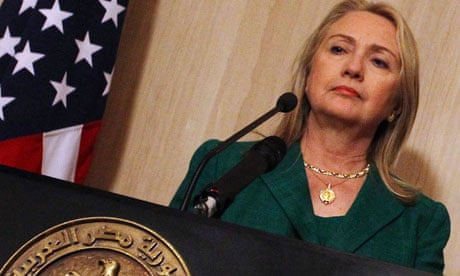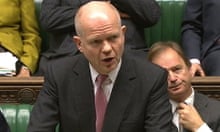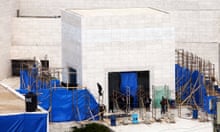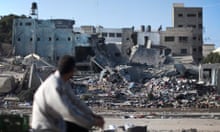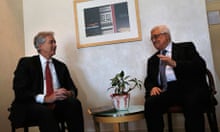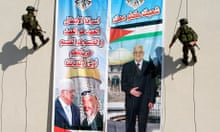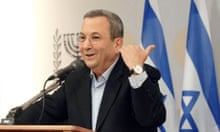The Palestinian leadership is warning Europe and the US that failure to support its bid for statehood at the United Nations on Thursday will further strengthen Hamas after the Gaza fighting by suggesting that violence, rather than diplomacy, is the way to win concessions from Israel.
Senior Palestinian officials believe the vote is a crucial test of whether there is a future for President Mahmoud Abbas's diplomatic strategy after his credibility was badly damaged among Palestinians by what they regard as the success of Hamas in the conflict with Israel this month.
Many ordinary Palestinians believe the conflict showed that standing up to Israel delivers results, in contrast to years of concessions under US peace plans, and drawn-out negotiations. European diplomats concede that the fighting has shifted the ground before the Palestinian request for recognition as a "non-member state". Failure to support Abbas could risk further undermining his increasingly weak position, to Hamas's advantage, they warn.
France has said it will vote in favour, and Spain is shifting in that direction. But the US and Britain are attempting to weaken the impact of a UN vote in support of statehood by putting considerable pressure on the Palestinian leadership to offer guarantees that it will not take advantage of the new status to accuse Israel of war crimes at the international criminal court (ICC) or seek territorial rulings at the international court of justice.
Palestinian officials said Britain and the US had pressed Abbas to sign a confidential side letter, which would not be presented to the UN general assembly, committing the Palestinian Authoritity not to accede to the ICC.
France has been pressuring the Palestinians to amend the resolution to
make it clear that Israel could not be taken to the ICC retroactively
for any alleged war crimes committed before the UN votes to recognise
Palestinian statehood.
Israeli officials are particularly concerned over an investigation of its assault on Gaza four years ago, Operation Cast Lead, which was widely condemned as a war crime because of the scale of Palestinian deaths and the level of destruction.
The Palestinians have already drawn up the necessary application to go to the ICC. It caused consternation when the chief Palestinian negotiator, Saeb Erekat, presented ths document at a meeting with the US secretary of state, Hillary Clinton, earlier this month.
A Palestinian close to the talks quoted Clinton as responding: "Don't you even go there."
Britain and the US also want Abbas to agree to begin negotiations immediately with the Israeli prime minister, Binyamin Netanyahu. The Palestinian leadership is demanding evidence that Israel is serious about talks after years of futile discussions during which the Jewish state continued its rapid expansion of settlements in the West Bank and other measures to seize land the Palestinians regard as part of a future state.
Nabil Shaath, the Palestinian official who has played a leading role in shaping the statehood request, told the Guardian before leaving for the meeting in New York that the Israeli assault on Gaza strengthened the case for seeking UN recognition. He said the Palestinian leadership would not be deterred by threats, such as the warnings from Washington and Israel that they could cut funds to the Palestinian Authority.
"Not to go to the UN would be suicidal for the Palestinian Authority. All these people [in Gaza] took the brunt of the attack and now we should chicken out because they [the US and Israel] will cut off some money? What we're doing is not violent; it's not military; it's not illegal," he said. "The world should see that if they keep maintaining the status quo, it will get you nothing but more bloodshed. That's the lesson from Gaza."
Shaath said the vote was an important test of whether there was a future for diplomacy, when talks had produced almost no progress toward a Palestinian state in years.
"Clinton just a few days before Gaza said it would be a very long time before the Palestinian issue is going to get attention. Which means what: we only get attention when we use force? If we get this vote, people will feel nonviolence produces results; if we do not, they will reach the opposite conclusion," he said.
Later, Shaath told a meeting with foreign diplomats it would be "immoral" for their countries to oppose the statehood resolution. The Palestinian Authority has warned countries with embassies in Ramallah, including Bosnia and Cameroon, that if they do not support the UN move they will be expelled.
The US, Israel and European countries have accepted that attempts to get the Palestinians to back down from seeking UN recognition have failed and that the move is all but guaranteed to pass, with the support of a majority of the general assembly. But Washington and London are putting considerable pressure on the Palestinian leadership over the ICC because, as one European official put it, "taking Israel to the court is a real red line".
For now, it appears the Palestinian leadership would prefer to retain the option to go to the ICC as a bargaining chip for future negotiations. But the pressure will only grow in meetings in New York immediately before the vote.
Britain says it is concerned at the Israeli response to Palestinian statehood after Israel's foreign minister, Avigdor Lieberman, has threatened to cancel all or parts of the Oslo peace accords and topple Abbas from power. And the UK says the statehood bid could end up harming Palestinian interests if the Israeli reaction is so severe that it sets back the prospects for peace.
But Palestinian officials are dismissive of the argument, saying there is no peace process to speak of and that Israel has done little to enhance Abbas's credibility by continuing to expand Jewish settlements and treating him with contempt.
Britain also pressed the Palestinians to delay the vote until after the Israeli general election, in January, fearing that Netanyahu's response may be made stronger by electoral considerations.
Israel recognises that the general assembly is all but certain to back the Palestinian move so it has focused its efforts on pressing European governments in particular to oppose or abstain in an effort to deny the vote legitimacy. Israel reasons that if most European governments and the US fail to support implicit recognition of a Palestinian state then it will be able to argue that Abbas has only the backing of dictatorships and less free countries.
European attempts to forge a common position have foundered, with Germany opposing the Palestinian request and France's president, François Hollande, wavering but then favouring it again.
Britain has also come under pressure from Arab countries that have made clear they regard the vote as a test of whether the UK is serious about pressing a solution to the Israeli-Palestinian conflict.
The Israeli push against the statehood bid includes cartoons on YouTube that show Netanyahu and world leaders gathered around a dinner table waiting for Abbas to arrive for peace talks.
"I am on my way to the UN. I am not coming to the table," he says.
A second video shows Abbas driving a bus toward a cliff by pursuing the UN bid.
The Palestinians chose 29 November as the date to submit the statehood request because it is the anniversary of the 1947 UN decision to partition British-mandate Palestine between Israel and an Arab state.
